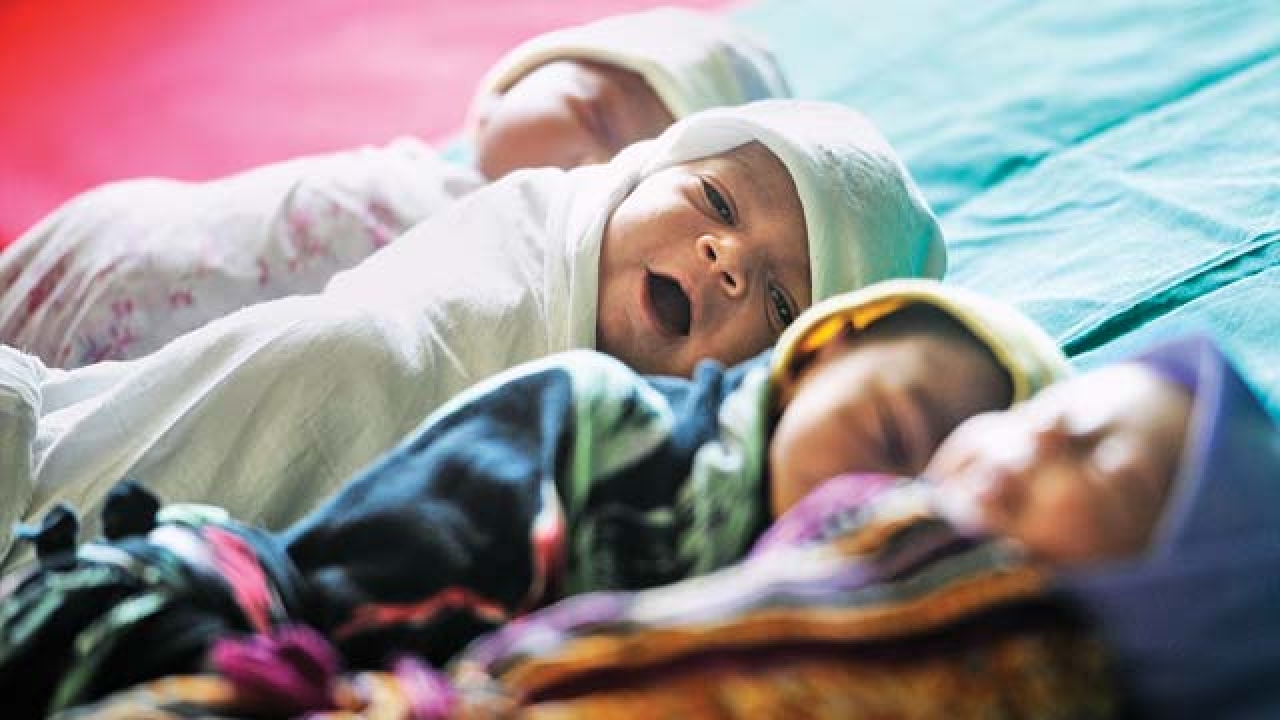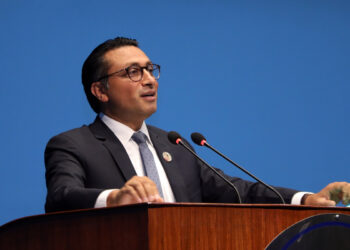KATHMANDU: Boosting efforts to fight pneumonia could avert nearly 23,000 child deaths from its infection and other major diseases in Nepal, a new analysis has found ahead of the first-ever global forum on childhood pneumonia in Barcelona (January 29-31).
According to modeling by Johns Hopkins University, scaling up pneumonia treatment and prevention services can save the lives of about 9,000 children under the age of five.
It would also create a ‘ripple effect’ that would prevent more than 14,000 extra child deaths from other major childhood diseases at the same time, underscoring the need for integrated health services. Pneumonia is caused by bacteria, viruses or fungi, and leaves children fighting for breath as their lungs fill with pus and fluid.
It is the biggest single killer of children, claiming the lives of 800,000 children last year, or a child every 39 seconds. The disease is a leading killer of children in Nepal, causing 13 percent of under-five deaths.
Globally over the next decade, deaths are likely to be highest in Nigeria (1.4 million), India (880,000), the Democratic Republic of Congo (350,000) and Ethiopia (280,000).
Although some types of pneumonia can be prevented with vaccines and can be easily treated with low-cost antibiotics if properly diagnosed, one out of five one-year-olds in Nepalis unvaccinated, and many children suffering from pneumonia symptoms do not get access to medical treatment.
Child deaths from pneumonia are concentrated in the world’s poorest countries and it is the most deprived and marginalized children who suffer the most. Forecasts show that over 18,000 children under the age of five could die from pneumonia between 2020 and 2030 in Nepal, on current trends.
Globally over the next decade, deaths are likely to be highest in Nigeria (1.4 million), India (880,000), the Democratic Republic of Congo (350,000) and Ethiopia (280,000).
Most deaths due to pneumonia occur among children of the poorest households who are affected by the convergence of poor nutrition, poor hygiene and poor immunization rates which increases their risk of falling ill and the inability of their families to get the appropriate care in time to prevent their untimely death.
Health interventions aimed at improving nutrition, providing antibiotics and increasing vaccine coverage, boosting breastfeeding rates are key measures that reduce the risk of children dying from pneumonia and would also prevent thousands of child deaths from diseases like sepsis, diarrhea, and meningitis.
“The number of lives that could be saved is potentially far higher as the modeling did not take account of factors like availability of medical oxygen, or action to reduce levels of air pollution, a major risk factor for pneumonia.”, said Kevin Watkins, Chief Executive of Save the Children, said.
“These results show what is possible. It would be morally indefensible to stand and allow millions of children to continue to die for want of vaccines, affordable antibiotics, and routine oxygen treatment.”
Likewise, Jean Gough, UNICEF South Asia Regional Director said, “South Asia has made great strides in reducing pneumonia deaths between 2000 and 2018 mainly because parents and caretakers are increasingly vaccinating their infants and taking their children for medical treatment.
However, many of the deaths are not registered, particularly in underserved areas.
Most deaths due to pneumonia occur among children of the poorest households who are affected by the convergence of poor nutrition, poor hygiene and poor immunization rates which increases their risk of falling ill and the inability of their families to get the appropriate care in time to prevent their untimely death.
He highlighted the need for greater efforts to strengthen access to and use of preventive and curative child health care at the community level. In fact, the scale of the air pollution challenge could undermine the impact of scaling up pneumonia-related interventions. Ninety-one percent of the world’s population is breathing outdoor air that exceeds WHO standards.
Henrietta Fore, Executive Director of UNICEF, said, “If we are serious about saving the lives of children, we have to get serious about fighting pneumonia. As the current coronavirus outbreak shows, this means improving timely detection and prevention. It means making the right diagnosis and prescribing the right treatment.
It also means addressing the major causes of pneumonia deaths like malnutrition, lack of access to vaccines and antibiotics, and tackling the more difficult challenge of air pollution.” Outdoor air pollution contributes to 17.5 percent – or nearly one in five – pneumonia deaths among children under five worldwide, according to a study by the Institute for Health Metrics and Evaluation (IHME-GBD).
Household pollution from the indoor use of solid cooking fuels contributes to an additional 195,000 (29.4 percent) deaths. Ninety-one percent of the world’s population is breathing outdoor air that exceeds WHO standards. The scale of the air pollution challenge could potentially undermine the impact of scaling up pneumonia-related interventions. Other causes of pneumonia deaths include malnutrition and lack of access to vaccines and antibiotics.
According to the Johns Hopkins modeling, of the total 8.9 million deaths from all causes that could be averted over the next decade, 3.9 million would be the result of greater efforts to reduce levels of malnutrition alone.
Among the announcements to be made at the forum include a more affordable, PCV vaccine from the Serum Institute of India and political commitments from governments in high-burden countries to develop national strategies to reduce pneumonia deaths.
Dr Seth Berkley, CEO of Gavi, the Vaccine Alliance, said, “Pneumococcal pneumonia is an easily preventable, often treatable disease – no parent should go through the agony of losing their child to this disease. Over the past decade, we have made progress in boosting the number of children receiving a lifesaving pneumococcal vaccine and it is vital that we keep up these efforts to protect the next generation against this deadly disease.
Gavi’s donor pledging conference in June will offer the international community the chance to help us do so.” Quique Bassat, Research Professor at the Barcelona Institute for Global Health (ISGlobal) and Chair of the Global Forum on Childhood Pneumonia said, “The disease that kills most children in the world cannot be neglected any longer in terms of its scarce global research funding. Research and innovation need to drive policy change and lead the way for further decreases in pneumonia-attributable mortality.
“Leith Greenslade, Co-ordinator of the Every Breath Counts Coalition, said: “This analysis shows that collective action to protect children from pneumonia could really boost national efforts to achieve the SDG for child survival.
Governments and international development agencies must act urgently to protect the most vulnerable children from malnutrition and exposure to air pollution, and ensure that they receive pneumonia-fighting vaccines and speedy diagnosis, child-friendly antibiotics and oxygen if they become sick.
If they don’t, 9 million children’s lives are at stake.” On January 29-31, the nine leading health and children’s organizations –ISGlobal, Save the Children, UNICEF, Every Breath Counts, “la Caixa” Foundation, the Bill & Melinda Gates Foundation, USAID, Unitaid and Gavi, the Vaccine Alliance – are hosting world leaders at the Global Forum on Children Pneumonia in Barcelona, the first international forum on childhood pneumonia.
Among the announcements to be made at the forum include a more affordable, PCV vaccine from the Serum Institute of India and political commitments from governments in high-burden countries to develop national strategies to reduce pneumonia deaths.









Comment